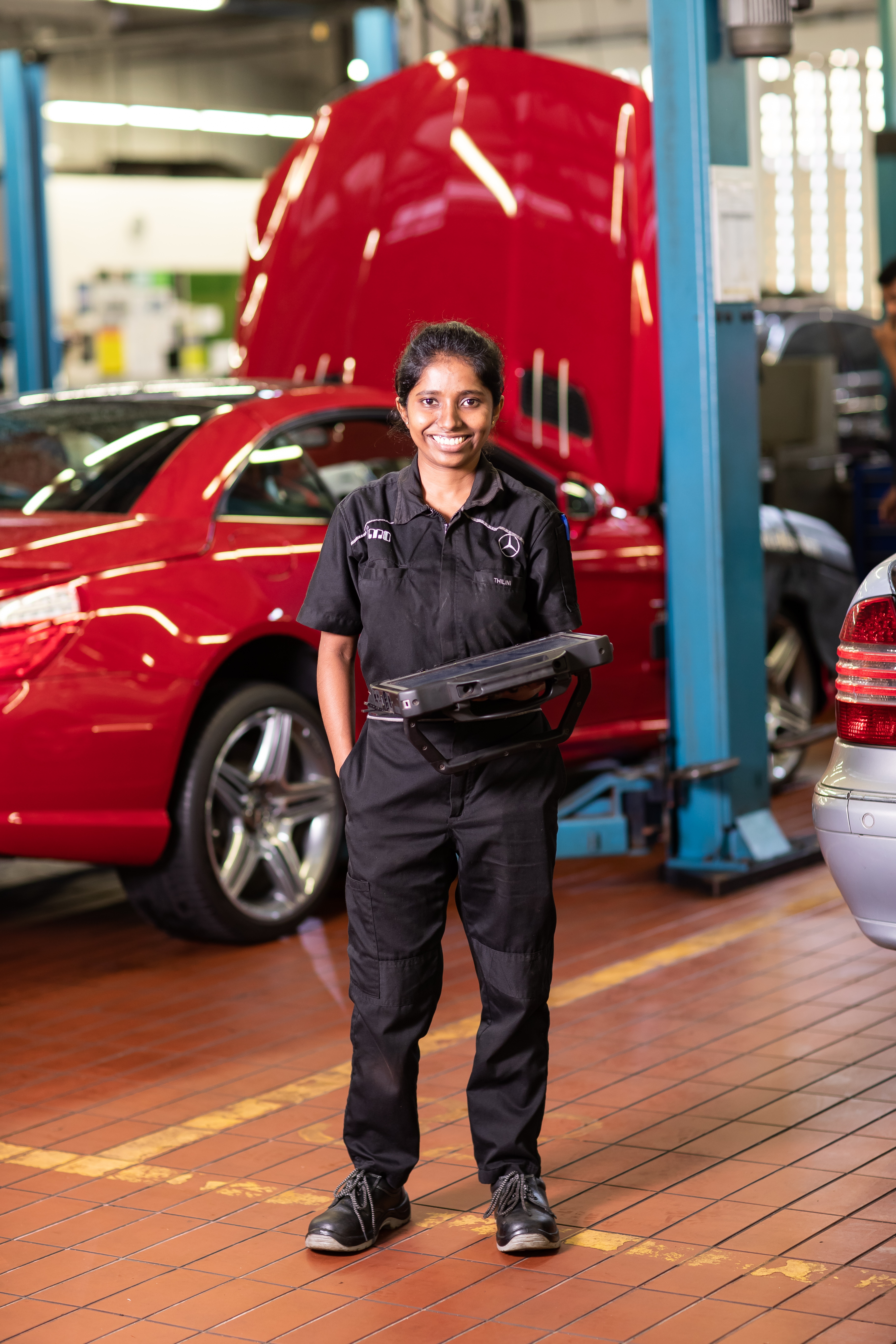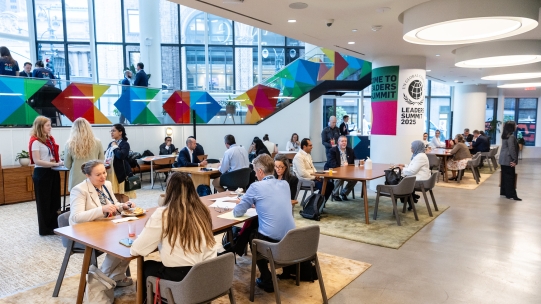Sri Lankan companies advancing gender equality in the workplace
Read more

Gender equality has been a struggle in Sri Lanka, where women and girls face structural barriers and cultural stereotypes that limit their workplace options, financial security, political participation and personal safety.
Only about one third of the nation’s paid labour force is made up by women and the first woman to serve as CEO of a major company was appointed just two years ago in 2020. And even though the world’s first female prime minister was Sirimavo Bandaranaike, elected in what was then Ceylon in 1960, today women in Sri Lanka hold only about 5% of seats in parliament.
“We are the first country in the world to have a female prime minister,” said Janani Wijetunge, Global Compact Local Network manager. “We proudly talk about that statistic, but the progress we have built on it is very, very little.”
But despite obstacles amid the nation’s political and economic crises, signs of progress are emerging in corporate culture as Global Compact Network Sri Lanka challenges companies to tackle gender equality and equity in the workplace.
One corporate leader is John Keells Holdings PLC, a diversified conglomerate with 70 companies across seven industry sectors, that extended its parental leave from five to 100 days for both mothers and fathers.
This was significant in a country where maternity leave is mandated but companies bear the full cost of maternity leave pay. Sri Lankan women are often discouraged from continuing to work after having children, and few workplaces have childcare facilities. The country has no laws requiring paternity leave.
Technology engineering giant Virtusa set up regional Diversity and Inclusion (D&I) councils to define localized pathways to meet its global targets, and clothing manufacturer MAS Holdings set a target for a 50% gender balance at all management levels by 2025.
Each of the companies participated in the Global Compact Local Network’s first round of the Target Gender Equality initiative in 2020/2021.
HealthRecon Connect scaled up its performance appraisal system and created a plan for systemic change using the Gender Gap Analysis Tool of the Women’s Empowerment Principles, a joint platform of the UN Global Compact and UN Women.
One of Sri Lanka’s biggest gender equality success stories comes from Diesel & Motor Engineering Plc (DIMO), a conglomerate that operates in more than 15 business sectors. It was founded eight decades ago and is headquartered in Sri Lanka with more than 1,800 employees. Its biggest businesses are automobile after-sales, agriculture and retail.
Women’s workforce participation at DIMO in 2022 is just 10%, a slight increase from 8% in 2011. The progress has been promoted by the company’s leadership who decided DIMO could not keep perpetuating stereotypes and ignore half of the population and its customer base.
Culture Change
At the heart of DIMO’s strategy has been the concept of “culture change”, whereby the company isn’t only changing its workforce composition by hiring more women in traditional roles but aiming at core and non-conventional jobs in mechanics and engineering.
“This was a tough journey,” said Dilrukshi Kurukulasuriya, chief human resources officer at DIMO who said the male-dominated company was riddled with misperceptions, gender stereotyping and unconscious biases. Women were not viewed as having leadership potential and considered not aggressive enough in seeking out added skills, experience or mentors to rise through the ranks, she said.
“The industry itself was not very attractive to women,” she added. “To recruit females to non-conventional jobs was quite challenging.”
An attitude of chivalry permeated the company where men misunderstood the consequences of the ways they treated women, Kurukulasuriya said.
“They were always very caring, but they did not know that it creates a gender gap,” she said.
Male workers often found the presence of female colleagues alien and uncomfortable, according to Kurukulasuriya. She said: “It was not that we needed to get more females into the pipeline. We need to make the others ready mentally and physically to have them around.”

Thilini Gunasekara, aged 27, was trained by Diesel & Motor Engineering as a mechanical technician to diagnose and repair vehicles
DIMO mechanical technician Thilini Gunasekara, 27, said she encountered unwelcome chivalry as a workplace obstacle when she first started her job diagnosing and repairing vehicles. It is her first job since graduating from the free automotive vocational training that DIMO offers in conjunction with Mercedes Benz Daimler that includes all-female classes.
The soft-spoken Gunasekara is the only woman on her work team, although soon she will soon be getting female trainees to work with her. She said initially her colleagues would step in, thinking she could not handle the work.
“Some people, they say ‘she can’t do this,’ but after seeing the result, they see that ‘she’ can do the work,” Gunasekara explained. “There’s no difference between the male and female doing this job.
“We just have to prove that we can do it,” she added.
Sayuri Sumithrarachchi, 34, an electrical engineer who manages construction projects at DIMO, said she is frequently the only woman at building sites where she is often treated dismissively, ignored or mistaken for a lower-level employee.
“The thing about non-conventional jobs is that they’re hard,” said Sumithrarachchi. “You have to have the grit, the courage to push through. Some people tend to think that we’re not as capable as men.”

Sayuri Sumithrarachchi, aged 34, an electrical engineer managing construction projects, is often the only woman at building sites.
After participating in the Global Compact’s Target Gender Equality initiative, DIMO set the ambitious target of increasing women in decision-making roles to 40% by 2025. So far, the number of women in decision-making roles is 53, or 12.3%, up from 42 women in such roles in 2021.
DIMO recently took up the Women’s Empowerment Principles, which help guide business on promoting gender equality in the workplace, marketplace and community.
The company also offers paternity leave as well as parental leave after adoption.
It started an Employee Resource Group to bring male and female employees together to develop gender-smart solutions and focus on a revamp of recruitment and retention of women through mentoring and sponsorship and to tackle workplace harassment. It holds mandatory training to tackle unconscious bias, focusing on recruitment and promotions.
With continuous dialogue, within one year DIMO was able to increase the representation of women in non-traditional roles such as engineering, mechanics and technicians by 15%. The recruitment of women overall grew to 11% from 7% over two years.
In 2020, Global Compact Network Sri Lanka launched a new Gender & Diversity Working Group, comprised of members of the TGE programme who wanted to move beyond the accelerator’s objectives, keep learning and publicly advocate for change. Open to Network Sri Lanka Participants and with a Local Network Board Member as an advisor, the group puts a specific focus in 2022 on Engaging Men as Allies, Sexual Harassment in the Work Place and Women in STEM. It hosts regular sessions and events, including a recent one on “Women Technopreneurs”.
Changing the Regional Ecosystem
In the second round of the TGE programme, in 2021/2022, the Local Network teamed up with Global Compact Network Bangladesh to expand regionally.
Global Compact Network Bangladesh previously held a TGE round with 11 companies, one of which was DBL Group, a family-owned apparel and textile business. As a result, DBL teamed up with HSBC to structure bank loans that target gender equality and sustainability. Terms of the loans are linked to the borrower’s performance at increasing its percentage of female supervisors and reducing its greenhouse gas emissions reductions, a boost to gender equality and climate action.
Global Compact Network Sri Lanka is now embarking on a third round of the TGE programme, this time in collaboration with Global Compact Network Malaysia & Brunei and welcoming additional companies from the region. They have opted to not only build on good practices but to give the programme a wider reach by bringing in experts from South Africa, Colombia, Lebanon, India and Germany to share examples and strategies from all over the world.
“We’re trying to encourage companies to think beyond their traditional hiring practices and give more people opportunities,” said Wijetunge. “What we’re trying to encourage is to see beyond gender. Look at their skills, look at their experience and look at what they can contribute.”


